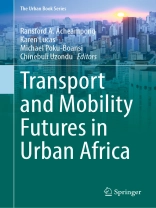This book provides a collection of insightful conceptual and empirical works that situate transport and mobility challenges in the unique context of individual countries and cities while highlighting commonalities across the African continent. Written from an interdisciplinary perspective, the book covers important themes in transport and mobility including the links between urbanization, urban structure, and accessibility; transport equity and poverty, non-motorized transport, public transport, and the challenges and opportunities of new and emerging transport technologies, and ICT-mediated mobility solutions. Each chapter engages with the normative imperatives that are critical to improving the transport and mobility situations of African urban areas now and in the future.
Inhoudsopgave
Introduction: Transport and mobility situations of African cities.- Part 1: Urban form, accessibility and travel demand.- Urban form, accessibility and travel demand in African cities: An introduction.- Urban form and access to public transport in Accra, Ghana.- Disparities in public transport coverage and bus service quality in Algiers.- An Analysis of transportation demand Patterns in Ghana.- Part 2: Transport poverty, equity and inclusion.- Transport poverty and social divisions in African cities: An introduction.- Mobility regimes and equity in urban transport: Examining women’s mobility experiences in Accra.- Community severance in urban Africa.- Transport poverty, distance covered to access to basic infrastructures and modal choice in urban areas in Cameroon.- Conceptualizing an urban transport framework for enhanced residential quality of life in Sub-Saharan Africa: Case study of Ghana and Namibia.- Part 3: Public transport policy and governance.- Public transport policy and governance in African cities: An introduction.- Bus rapid transit implementation in African cities: The case for a more incremental reform approach.- Pricing transport services in urban Ghana – The politics and socio-spatial conflicts between transport operators and the state.- Safe, inclusive public transport in Africa – Challenges and opportunities identified in Ghana and Namibia.- Part 4: Non-motorized transport and traffic safety.- Non-motorized transport and traffic safety in African cities: An introduction.- Planning for walkability in Johannesburg.- Exploring barriers and prospects of bicycle transportation: A case study of a Ghanaian University campus.- The provision of NMT in the City of Lusaka: An analysis of policy and practice.- The future of non-motorized transport in Urban Africa.- Part 5: ICT, platforms and new technologies.- ICTs, digital platform mobility services, and transport de-carbonization in African cities: An introduction.- Opportunities and challengesfor addressing personal safety concerns on public transport through ICTs in South African cities.- Smart mobility in urban Africa: Geography of diffusion, user characteristics and emerging impacts of digital platform/app-based mobility services.- e-Quantum leap: Planning for electric minibus taxis in sub-Saharan Africa’s paratransit system.- Conclusion: What futures for transport and mobility in African cities?












